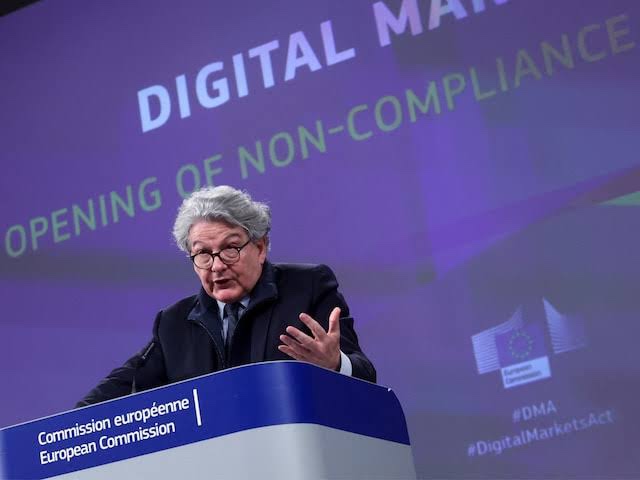EU investigates Apple, Google, Meta over new digital law

The European Union (EU) has initiated investigations into tech giants Apple, Google parent Alphabet, and Meta under the landmark Digital Markets Act (DMA). This move marks the first-ever probes under the new legislation, potentially resulting in significant fines against these US-based companies. The European Commission, the EU’s antitrust regulator, expressed concerns that the measures implemented by these tech giants may not fully comply with their obligations outlined in the DMA.
Since March 7, six major tech companies, including Alphabet, Amazon, Apple, ByteDance (owner of TikTok), Meta, and Microsoft, have been designated as “gatekeepers” and are required to adhere to the regulations set forth by the DMA. This legislation aims to foster a fairer digital environment by regulating the actions of the largest companies online and ensuring users have more choices.

Despite acknowledging some changes in the tech landscape, senior EU officials have indicated that they remain unconvinced by the efforts of Alphabet, Apple, and Meta to create a fairer and more open digital space for European citizens and businesses. According to Thierry Breton, the EU’s internal market commissioner, there are doubts regarding the compliance of these companies with their obligations under the DMA.
Under the DMA, the European Commission has the authority to impose fines of up to 10 percent of a company’s total global turnover, with the possibility of increasing fines for repeat offenders up to 20 percent. Additionally, in severe cases, the EU holds the power to break up companies. Unlike traditional EU regulations, which often entail lengthy investigations, the DMA mandates swift action, requiring regulators to complete their investigations within 12 months.
The investigations launched on Monday focus on whether Alphabet’s Google Play and Apple’s App Store allow app developers to present offers outside of their respective platforms free of charge. Furthermore, Alphabet is under scrutiny for potentially favoring its own services in Google search results, while Apple faces questions regarding the ease of app uninstallation on its iOS operating system and the design of web browser choice screens.
Meta, formerly known as Facebook, is also facing scrutiny over its ad-free subscriptions model, which has raised concerns about providing real alternatives for users who do not consent, potentially leading to the accumulation of personal data by gatekeepers. This latest probe adds to Meta’s legal woes in the EU, including previous fines for data privacy breaches.
In addition to the ongoing investigations, regulators will examine whether Amazon is promoting its own brand products on its platform, and they will assess Apple’s new fee structure for alternative app stores to ensure compliance with the DMA. The EU has also instructed these tech giants to retain certain documents for monitoring purposes. Apple, in particular, faces a slew of legal challenges on both sides of the Atlantic, including recent lawsuits alleging monopolistic practices in the smartphone market and fines related to music streaming subscriptions.














